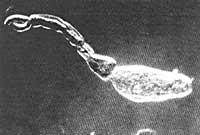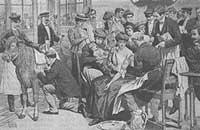First parasitic vaccine
1987/10/01 Elhuyar Zientzia Iturria: Elhuyar aldizkaria
So far diseases caused by parasites have not been treated with vaccines. The Pasteur de Lille Institute and the Transgene Association will put a schistosomiase vaccine on the street next year.
Schistosomiase affects 300 million people in Africa, Asia and South America and is one of the most widespread diseases in tropical countries. Every year one million people die from the disease. Survivors have kidney and intestinal problems.

The disease vector is well known and it could be thought that vaccine preparation can be simple. Otherwise. Schistosoma, the parasite, perfectly deceives the immune defenses of the organism. Parasite eggs are found in the patient's urine. When urinating, the eggs become larvae that become parasites of water molluscs. These larvae become another type of larvae that live free in the water. These larvae that live in the water contaminate people by infusing through the skin.
Larvae go to small blood vessels in the large intestine or bladder where they mature. Then the female proceeds to laying the eggs. Some eggs are released in the urine and others go to the liver.
In the first case there is pain and difficulty urinating. In the second, vomiting and diarrhea occur and finally death among black vomiting.
The functioning of vaccines is known: To strengthen the immune response of the body, foreign proteins are included that promote the manufacture of antibodies without producing disease. In the case of schistosoma this cannot be done because its molecules are covered with the protein of the victim and the body does not take them as strangers.
The collaboration of genetic engineering has been necessary to achieve the new vaccine. The disease-causing protein was first identified and the gene responsible for its manufacture was later recognized in the schistosoma genome. This protein can now be made and used as a vaccine.
In the sessions held so far with the baboons a total success has been achieved and it is believed that it will apply to the man for next year.





